Annual Report 2019
2019 Management Report
We demand that public institutions be held accountable, and with this report we lead by way of example. Read in detail about what we have done over the past year, what has worked and what hasn’t.
Our commitment: to investigate the public sector to improve it
We are an independent non-profit organisation founded in 2012. We believe that society and administration of the public sector can be fairer, more inclusive and more efficient for everyone if we understand the decisions that affect us, how these are made, how they are applied and the results they produce.
Therefore, we conduct in-depth investigations into the activities and operations of governments and public services, we design innovative informative projects, and we lobby with an independent, free voice for public authorities to be held accountable and for us all to have access to the information relevant to us.
This is our sixth Management Report, an exercise we undertake each year with enthusiasm, honesty and a critical eye in order to uphold the trust that so many people have placed in us, and to win more people over every day. You can also read the reports from 2018, 2017, 2016, 2015 and 2014).
More journalism
We uphold our commitment to rigorous, independent and in-depth reports, harnessing highly specialised knowledge in an intensive analysis of data and using open methodologies. Thus we are able to provide exclusive information which often goes unnoticed in other media. This has resulted in:
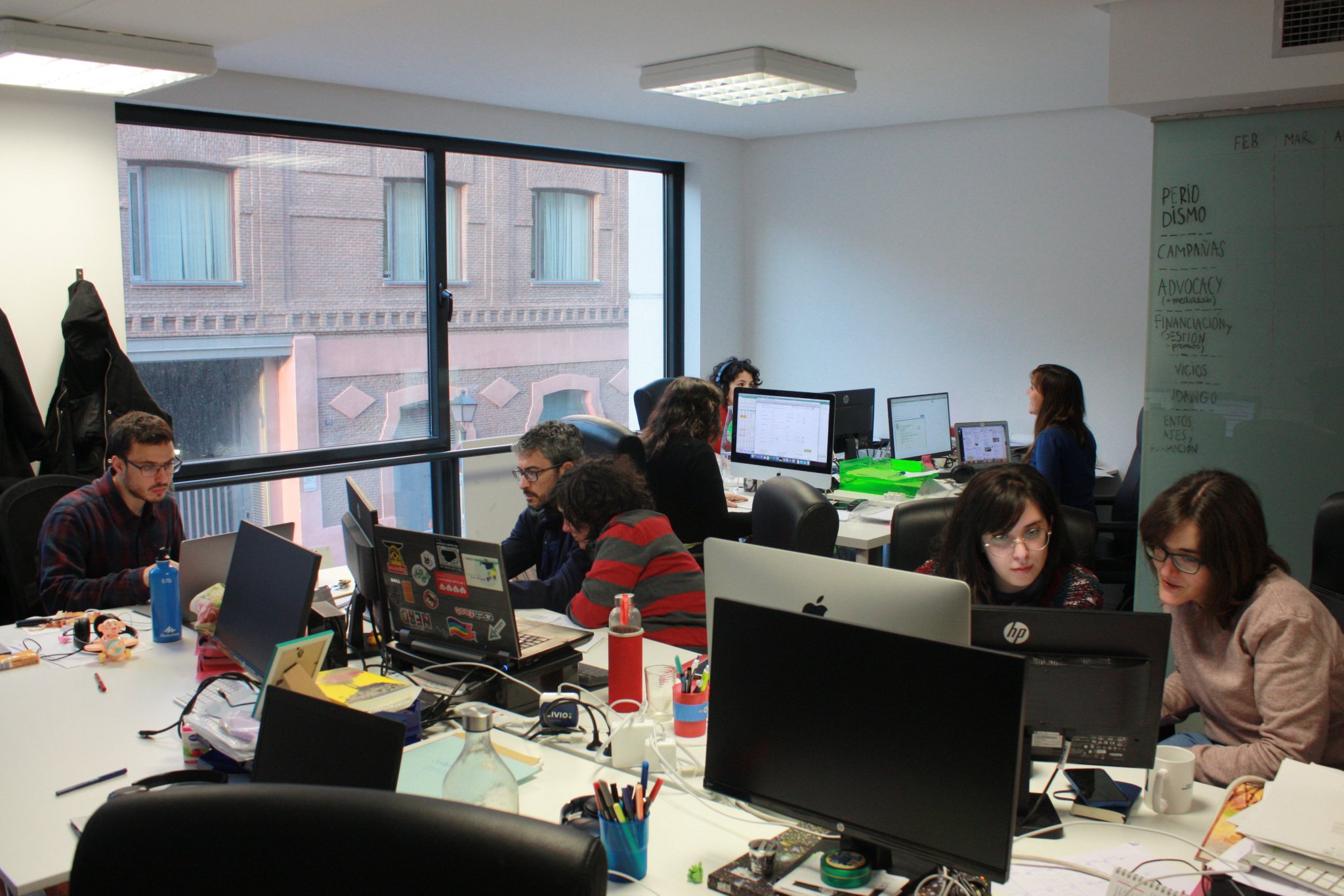
The Civio team, at the office
- Journalism that is watchful of power in order to provide previously unpublished information on bad practices in public sector management. For example, we were able to demonstrate that the Government’s Bono Social or discount rate app was denying the benefit) to people who had a right to access it. That only 5 of Pedro Sánchez’ 17 ministries had identified all of the people they had hired as advisors—and we revealed their names and positions.
We also disclosed that the Government could shut down digital services too if there were ‘threats to the public order’.
We analysed each and every set of citizenship papers granted in the past 25 years, revealing that Spain has given nationality by decree to one scientist for every four sports people. We updated El Indultómetro—our site on government pardons - with the 10,582 pardons granted between 1996 and 2018, and we took this to the airwaves thanks to the SER and A Vivir radio stations, with a segment called Illustrious Pardonees. We also once again highlighted the misappropriation of funds) to fatten the coffers, once again, of the Ministry of Defence. And much more, which you can find on our website.
- Public service journalism. In 2019 we reported on how one in ten education centres in Madrid had failed their most recent health and hygiene inspection, and that over half of the social centres that also failed were publicly-run. We also revealed how town halls in the Community of Valencia and Galicia are more than ten years late in fulfilling their legal requirement to have a local forest fire prevention plan in place. We also celebrated the 7th anniversary of El BOE nuestro de cada día! Seven years of reading, understanding, contextualizing, deciphering and explaining how the public sector works. Service journalism at its best.
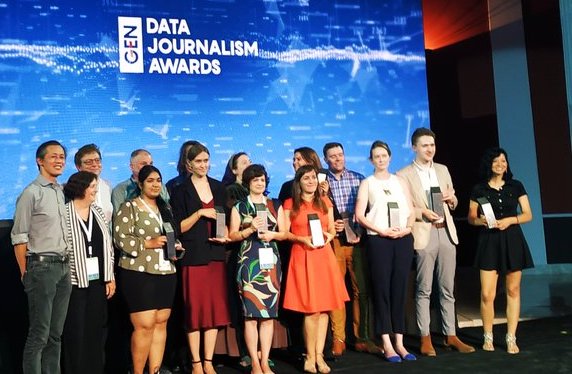
Eva, collecting the second Data Journalism Award
Additionally, we have again demonstrated that exceptional journalism is possible outside of the mainstream media. For this reason, the Global Editors Network awarded us our second Data Journalism Award, the most prestigious international recognition in data journalism. In 2019, the Best Individual Portfolio of the Year prize went to Eva Belmonte, adding to her Best Journalistic Investigation prize in 2016 for Medicamentalia. And our colleague Ángela Bernardo was awarded the Concha García Campoy of Scientific Journalism for her investigations into the conflicts of interest between healthcare professionals and the pharmaceuticals industry. This wasn't, however, her only award. She also received the "Profesor Juan Ramón Zaragoza" Journalism Prize for her special report on the dark side of botox, published in Hipertextual. We couldn't be prouder!
But the most important thing is that every day we have more and more readers who are exceptionally well-informed about public matters and institutional operations and we can put public authorities under the microscope every day, scrutinising their decisions and how they affect you, without relying on anybody else.
En figures
-
88 articles published in 2019.
-
615,000 unique readers and 1.1 million page views in 2019. Far less than the records for the first half of 2020, in which we have registered more than 2.5 million unique readers and more than 4 million page views so far this year.
-
Our information has been the source of over 220 articles in media channels such as La Sexta, elDiario, La Marea, El Confidencial, Cadena SER, La 1, Krautreporter (Germany), Algorithm Watch (Germany) or via the pan-European EdjNET network.
Objectives set out in the 2019 Action Plan:
Maintain and update our current information projects
More advocacy
The social and cultural changes we pursue don't just happen by themselves, and as such we make a huge effort so that we can all access key information in the sphere of public administration. And we do so via exhaustive knowledge of the rules and by calling for highly specific changes, in the interest of society as a whole.
Our members are already aware that ▶️ the Supreme Court has ruled in our favour and compelled the Court of Audit to identify all of its temporary employees:https://t.co/U6QZSFIbtD…
— Civio (@civio) December 17, 2019
The ruling states that #transparency takes prevalence over the #protectionofdata of their trusted staff. pic.twitter.com/Z9a8g55PmG
The big news of the year broke in December. The Supreme Court ruled in our favour and decreed that public authorities are obliged to provide citizens with information created before the Transparency Law entered into force. After five years of fighting, we won a crucial victory for the advancement of transparency in Spain. And that wasn’t the only one: the Supreme Court also sided with us in another case and will compel the Court of Audit to identify all of its temporary staff.
But these are only two of the six court cases against the opacity of public institutions that we rounded 2019 off with. We are also appealing the Transparency Council’s refusal to require that the programme code which decides who can access the discount rate for electricity be made public. We assert that the right to know also extends to those computer programmes which on a daily basis make decisions about the life of citizens. Institutions that seek to veto public information should know that we will continue to fight—stronger than ever. Because we don’t care which party is in Government: what we demand are transparent institutions which are held accountable.
And that’s not all. We kicked off the year denouncing the failure to fulfil promises on transparency which the Government of Pedro Sánchez committed to when it came to power, such as publishing the schedules of senior officials, or passing the regulations for the Transparency Law. This ‘oversight’ of transparency was not just down to the Government but also the majority of the main parties; regulating lobbies, publishing the ‘legislative footprint’, or allocating more resources to the Transparency Council were all promises that featured in the electoral programmes of certain groups in the April 2019 elections, but which all but disappeared come the November vote. This all only confirms that there is much work still to do.
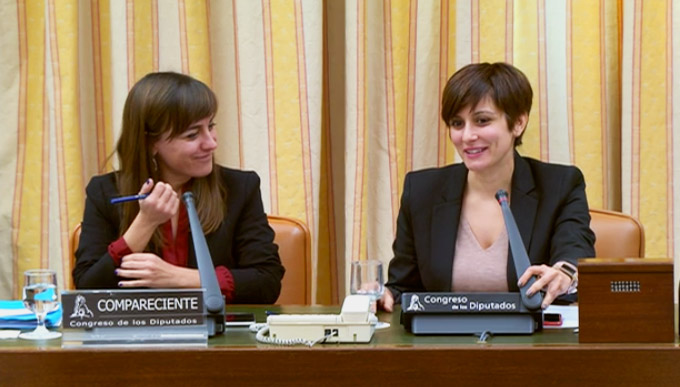
Eva, at the Justice Commission
Furthermore, we appeared before Congress to call for an end to the arbitrariness and opacity of pardons. Our patron, Javier de la Cueva, a great ally in our fight against opacity, also appeared before the Chamber to defend our right to disclose the public source code and algorithms that public authorities develop. Both in April and in November, in view of the elections, we demanded more commitments like transparency from the political parties. And we used everything that we’ve revealed over these years on the black holes within the healthcare system to promote, amongst other organisations and professionals, a Popular Legislative Initiative (ILP in Spanish) called Medicine for a fair price which bolsters the Healthcare Administrations’ ability to set prices for medicine in a more transparent way, so that research and the training of healthcare professionals is more independent and thus avoiding the potential conflicts of interest which arise from private funding by laboratories.
In 2019 we played a key role in ensuring that the Transparency Act of the Community of Madrid made lots of data available to the people of Madrid, which they were previously unable to access, removing obstacles in the right to request information and incorporating a register of lobbies. Moreover, the government has taken a number of our proposals for improving the discount rate on board as part of its Strategy Against Energy Poverty although we will have to wait to see how this materialises. We also pushed for Spain to stop being one of only a few European nations that does not publish the Trade Registry in an open and free way.
At Civio we lead by way of example. Our relationship with authorities and public officials is transparent and non-partisan, as demanded by our Code of Ethics. Since May 2015, we have published our own meeting log. In 2019, we held 9 meetings with the intention of influencing public policies. The attendees, the topics covered and the documents handed out, if any, are all completely public on our website.
Objective set out in the 2019 Action Plan:
Improve the transparency of public administration, increasing the information available on government activities and promoting access to this for all citizens.
More collaboration and training
We have continued to share our knowledge and cooperate with citizens, civil society organisations and numerous public authorities.
Con la ciudadanía
This year we took two important steps towards better involving more people in our work.
- We launched Datos.Civio.es, a site where we share the raw materials from our investigations: the data. A huge amount of information that was previously not public has been freed up, classified and opened for any public institution, academic entity, social collective and any citizen to use. Today you can find over 70 released data sets, ready for you to use, which have already been downloaded hundreds of times.
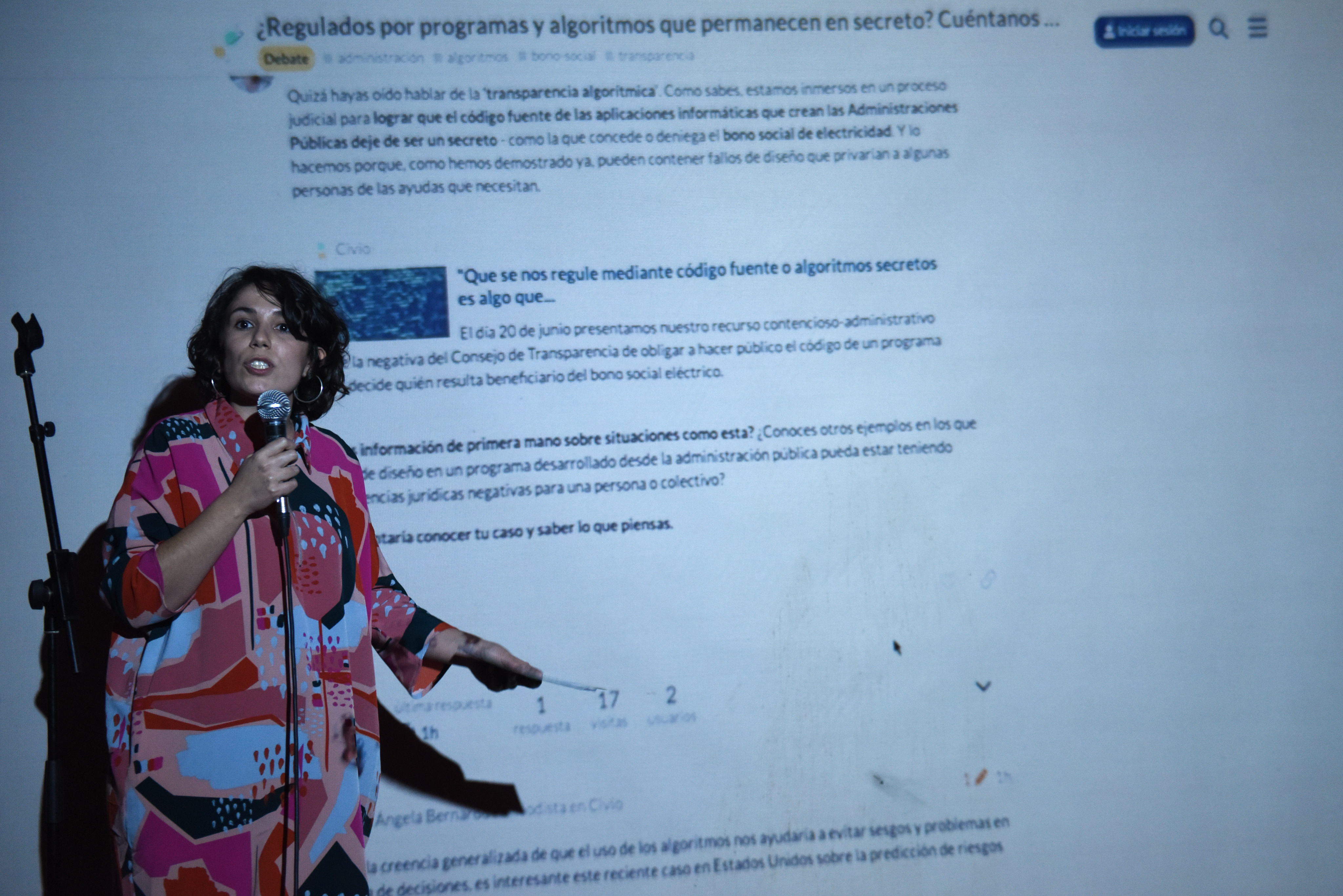
Olalla presenting the Community
- We launched Civio Community, a meeting place for debate, collaboration and learning which we have started with the vital support of Engaged Journalism Accelerator. Over 330 people already participate here, giving us a helping hand, contributing their knowledge and experience, and accessing useful resources and information to learn more about our lines of action. In it, 949 topics have been published in it since we launched it, and throughout the coronavirus emergency in 2020 it has served as the participation hub through which we have been able to provide useful and practical information to the thousands of people who have asked us for help.
Further, we held a meeting with our members and donors in Zaragoza; celebrated a ‘Data Fest’ at El Intruso, in Madrid, attended by hundreds of people and where we presented our latest projects in Autumn; and for another year running, we surrounded ourselves with members and friends at the annual Christmas meet held at our offices.
Our tools, at your fingertips
We continue to make free public tools available to everyone. In 2019:
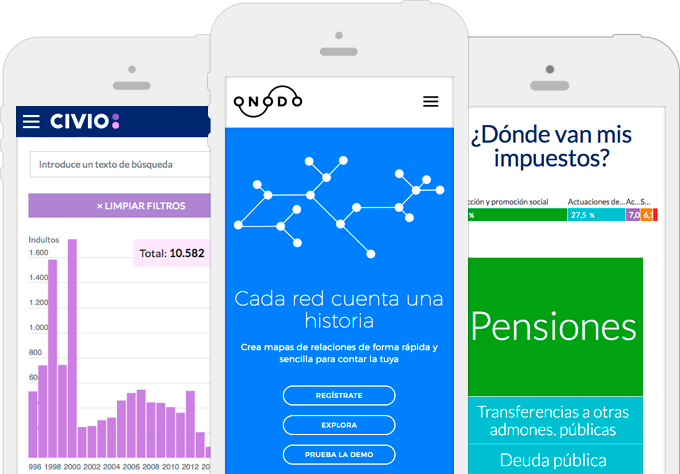
-
Almost 20,000 individuals and organisations have already created over 45,000 interactive visualisations of networks and nodes with Onodo.org.
-
Some 83,000 people used our app to find out if they were eligible for the discount rate. Since its launch, it has been used almost half a million times.
-
Over 30,000 people used ¿Dónde van mis impuestos? (or Where do my taxes go? in English) to easily explore the General State Budgets.
-
The map of establishments in Madrid that failed their last food safety test recorded over 105,000 visits.
-
The pardon finder at El Indultómetro, a unique tool in terms of accountability, was used by 7,000 users.
-
More than 18,000 people accessed the search engine for public works contracts at Quién cobra la obra and the records of construction companies and contracting authorities.
-
11,000 unique users accessed the España en llamas app to interactively explore detailed information about major forest fires.
With other organisations
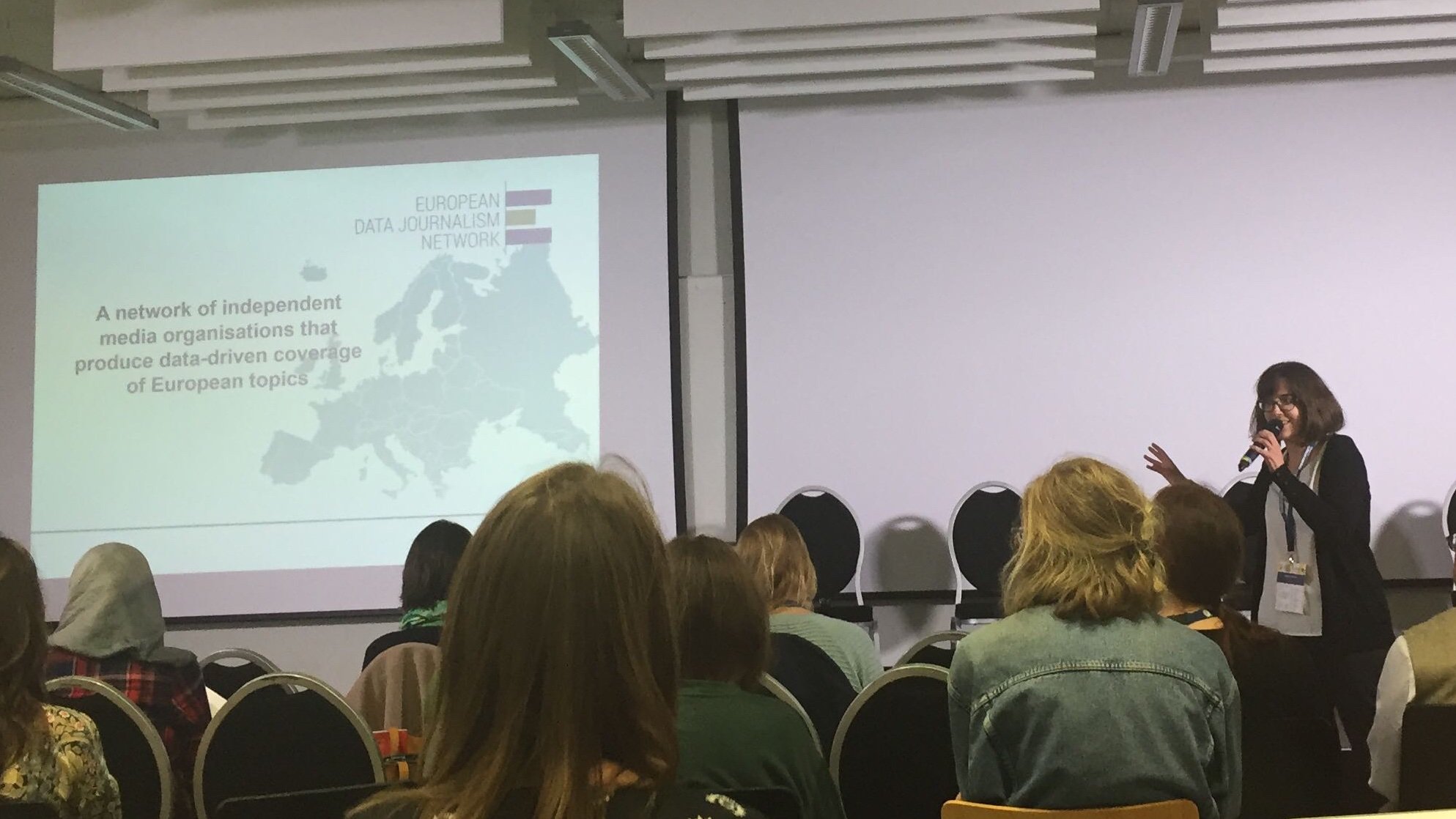
Ángela, during an EDJnet meeting
In 2019 we have covered thousands of miles, perhaps more than in any other year. Our participation on the RECORD project on transparency in public contracts took us to Poland and Budapest. We participated in learning events held by the Engaged Journalism Accelerator in Berlin, Budapest, Amsterdam and Birmingham. The Fandango consortium, which applies technological advances to data to reveal fake news took us to Naples and Rome. In Belgium we delivered workshops at the European Investigative Journalism Conference and at Dataharvest. In Germany, during the Global Investigative Journalism Conference. We attended the Global Fact Conference in South Africa. Our participation in the European Data Journalism Network (EDJnet) then took us once more to Berlin. Participating in the Obama Town Hall by the Obama Foundation in the same city, and exchanging a few words with the former president of the USA, was one of the most special moments of the year. We also attended Conspiracy for Democracy in Budapest and the Alaveteli Con in Oslo.
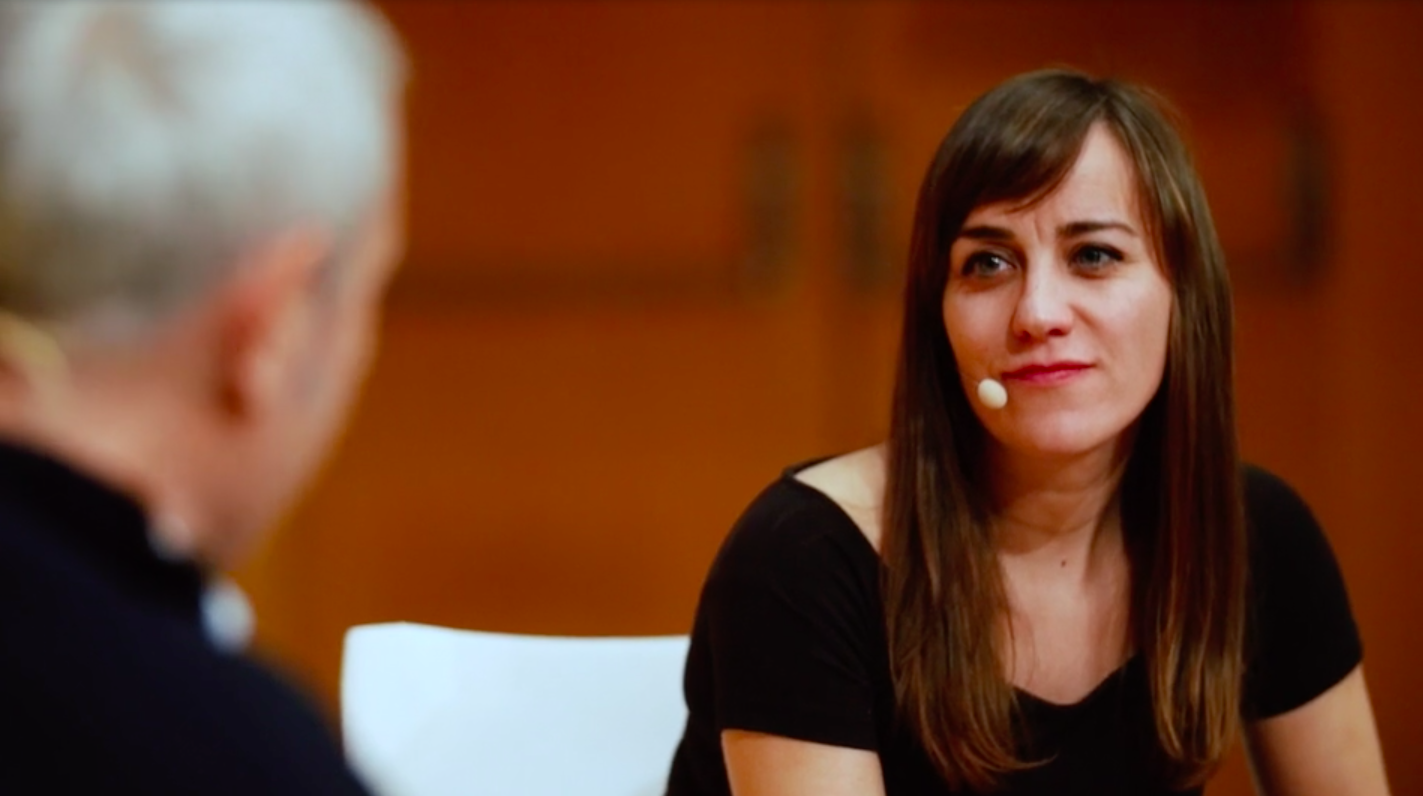
Eva, being interviewed during the Observatorio PerCientEx
In Spain, we shared our action on the discount rate at Mares de Energía; at the ‘I Jornada del Observatorio PerCientEx by Periodismo Científico’; at the Espacio compliance by CNMC on the urgent regulation of lobby groups; at the ‘Responsabilidad social en la investigación’ workshops by the Fundación DRO; at the World Radio Day with Inforadio by the Universidad Complutense de Madrid; at the event on transparency and access to data by the student delegation of the Faculty of Pharmacy at the Universidad de Alcalá; at the talks on Science in the Parliament; at the ‘XVI Spanish Seminar on Information and Documentation’ by FESABID; at the Communicate Science Workshops by the Unit of Scientific Culture at the University of Murcia and the Campus Gutemberg-CosmoCaixa.
With Public Authorities
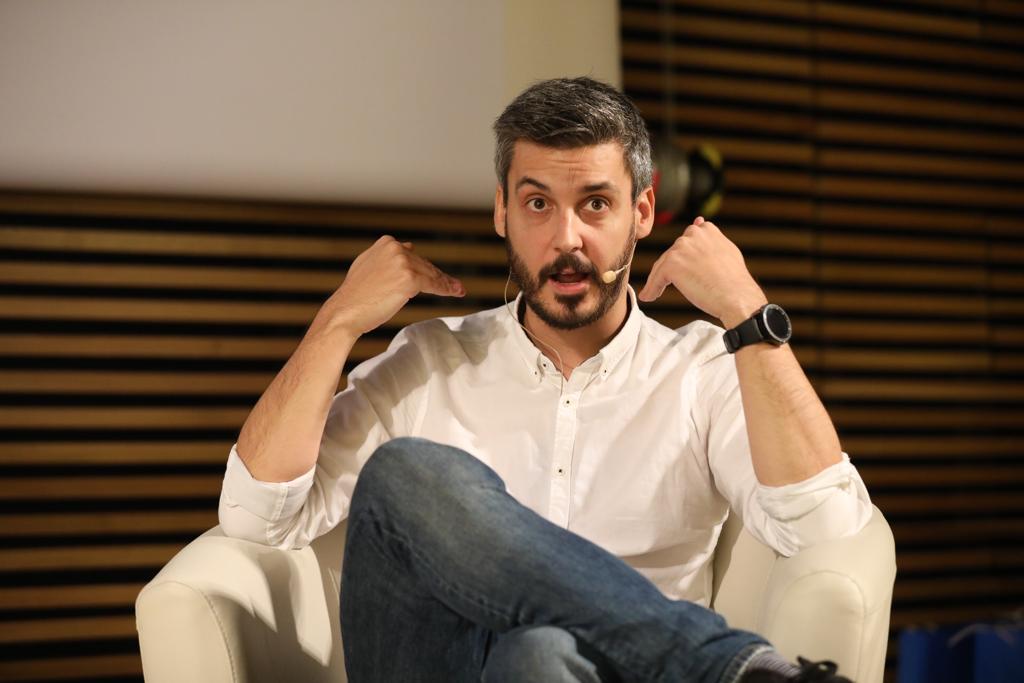
Miguel Ángel Gavilanes at an event at the City Council
Training for professionals in the public sector is another of our channels of collaboration. We have thus trained public workers from the Community of Madrid to acquire the theoretical and practical skills that will allow them to better meet the demands for information and transparency of citizens. We have also participated in institutional workshops such as those held by Dret a saber from the sphere of Govern Obert by the Generalitat de Catalunya, the III Workshop on Transparency and Open Data by the Madrid City Council and Opening the Authorities to Citizens by the Junta de Castilla y León.
In figures
-
16 training sessions delivered in 2019.
-
Some 240 students trained.
Objectives set out in the 2019 Action Plan:
Deliver tools and processes that strengthen citizens' capacity to monitor public authorities.
Increase the capacity of civil society to better participate in public processes.
Team
The Foundation’s Board of Trustees has remained as-is since its 2018 shuffle, the current members being: Rodrigo Tena (notary and member of the Hay Derecho Foundation), Javier de la Cueva (lawyer), José Luis Marín (Euroalert), Marisol García (RAIS Foundation), Olivier Schulbaum (Goteo) and the two Civio founders (Jacobo Elosua and David Cabo).
In January we fully launched the joint management model at Civio with both David Cabo and Eva Belmonte at the helm. We ended 2019 with a team of 9, with the additions of Olalla Tuñas (community manager), Carmen Torrecillas (front-end developer and data visualisation) and Ana Villota (Administration and Operations Manager). Since January 2020 there have been 10 of us, after Antonio Hernández joined us in web development and data visualization. Further, in the last half of 2019 we enjoyed the support of a part-time staff member, María Cimadevilla, for campaigns and member relations.
Accounts
In 2019, Civio continued to operate as an economically sustainable organisation. The year ended with pre-tax operating profits of €100,983 according to the provisional annual accounts (which are being audited externally, as is habitual). Our revenue grew to €563,133, a 10% increase on the previous year and an improvement of 22% on the forecast of €459,940 set out in our Action Plan.
Expenses, some €459,756, were higher than our forecast for the year—which was €426,498. The majority, 79%, went on staff salaries, which have remained within a salary range of between €21,000 and €28,500, with an additional variable bonus of €15,000 gross shared between the entire team for end of year results obtained. The salaries of the executive directors also remained the same as 2018, at €39,500.
Revenue
Expenses
Revenue for 2019 (€563,133) came from:
-
Civio members and one-off donors (€69,836, 12% of the total)
Donations from our regular members and other people who have made one-off donations have proven vital: increasing by 20% over the previous year and closing the year with 552 members. The total revenue derived from such support amounts to 2% more than our forecast in the Action Plan, although the number of members is lower than forecast at the start of the year.
-
Provision of professional services (€125,829, 22% of the total)
Revenue for technical support services for institutional transparency (based on the tool ¿Dónde van mis impuestos?) was lower (€119,622) than in 2018, although it remained a significant pillar of our sustainability. Added to this was training, which generated €6,207. Revenue from services exceeded the forecast in the 2019 Action Plan (€70,000).
-
Institutional support and prizes (€367,468, 65% of the total)
Revenue based on institutional support and grants grew some 60% over the previous year and came in its entirety, as in other years, from outside of Spain. Our participation in the European FANDANGO project (€84,384), the support of two grants from OSIFE (Open Society Initiative for Europe, €122,948 in total), the Google grant to develop a prototype to analyse video transcripts for journalistic purposes (Google Digital News Initiative, €37,805) and the European Journalism Centre grant to improve our community (€50,800) are the most notable from this part of our financing.
As established by The Foundations Act, the 2019 operating profit will be used to advance Civio’s mission and achieving our founding purposes. Specifically, they will be transferred to a support fund which will allow us to face potential financial years where revenue does not cover our expenses.
In 2019 we held back to ensure that, despite a forecast of extra revenue (mainly thanks to participating in European projects, a less stable and predictable source of funding), we wouldn’t grow in terms of staff beyond what was required and responsible. Doing so entailed a huge effort by our team. Further, we made the decision not to actively market our new services (technical support and the deployment of tools) to public authorities. The reason for this change in business model was, on the one hand, to be able to focus better on activities that are more aligned with Civio’s mission, and on the other, to boost more strategic revenue streams: for Civio members and donors to take on a larger role in our funding to provide greater stability and independence.
The reserve fund will help us to take on this challenge, but not only that. It also offers us more flexibility to deal with unforeseen circumstances. For example, with the coronavirus emergency, it allowed us to postpone any activities not related to immediately helping citizens become better informed and ride out the uncertainty. Additionally, it will be fundamental for initiatives that require months and months of data work and research, such as analysing public contracting. Our mission and our organisation are not just a flash in the pan. We’re here to stay.
Our annual accounts have been made public since we started, and can be browsed here.
Objetivo previsto en el Plan de Actuación 2019:
Ensure the sustainability of the growing organisation. The forecast revenue was exceeded, we have continued to grow and we face 2020 from a position of optimism and stability.
Increase the number of members and donors at a rate sufficient to provide us greater stability and independence compared to other sources of funding.
Thanks

David and Eva, presenting the Civio Data Party
We continue to pursue genuine and measurable impact, and over the years we have achieved very important changes for the greater good. None of this would be possible without the many people who push us daily so that we can continue to promote transparency and accountability with more determination than ever. Their names would fill more space that we have in this entire report. Our most heartfelt thanks to everyone:
-
First and foremost, to the almost 920 members who make regular donations and the more than 1,300 donors who have made ad-hoc contributions to our work since we got started. Living up to the trust you place in us is our number one priority. None of this would be possible without you.
-
To all of the people who have worked with us selflessly in 2019. For example, via the Civio Community. Improving how we listen and channel your desires to help is one of our main priorities.
-
To all the authorities and professionals in the public sector that have listened to us to find ways of opening institutions to the public.
-
To the media outlets that have trusted our projects and all of those who republish our content, reaching more people by the day.
-
To the dozens of civil society organisations that, in Spain and abroad, share their formidable knowledge with us.
-
And to the many thousands of people who follow our work with interest and share it. We will strive to rigorously and credibly demonstrate that, if you support us, it will be worth it.
Our greatest victory has been to close 2019 with you all by our sides, looking forward to continuing our efforts to achieve a greater impact with your support.
Thank you for your trust!
Jacobo, David, Eva, Miguel Ángel, María, Ángela, Olalla, Carmen, Ana and Javi.
We need your donations to continue monitoring public authorities and put an end to opacity.
Helping us to keep our work independent is the only way we can carry on doing our duty.